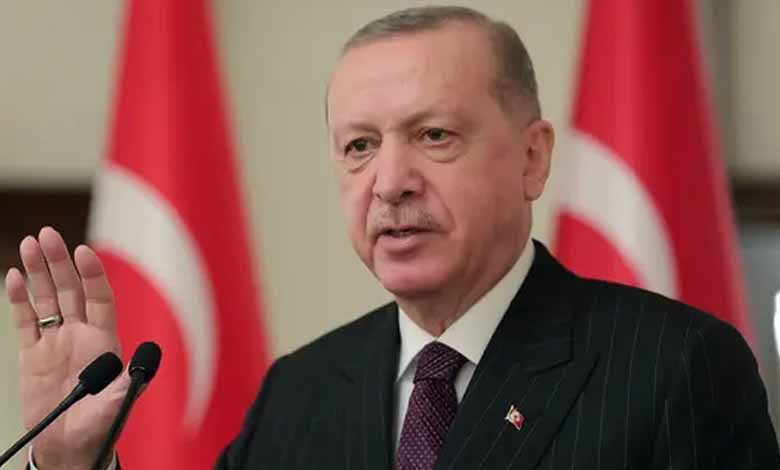Erdogan spends $ 15 billion on ‘pink dream’… And the poverty rises

Turkish President Recep Tayyip Erdogan does not care about the living conditions of his population, his government and him are implementing unnecessary plans and projects and will only serve their ambitions.
Although the Turkish lira lost 30% of its value in 2020, the inflation rate rose to 15% and the queue of unemployed people exceeded the level of 4.3 million Turks, the Turkish sovereign fund has announced that it was ready to launch an investment program worth $ 15 billion, to invest in the fields of energy, gold and petrochemicals.
It comes at a time when Turks are suffering from hunger, high prices and unemployment which has raised questions about the feasibility of investments and will they save the struggling Turkish economy or is it a new episode in the series of failures of the Erdogan regime in dealing with the financial crisis?
In this context, Bloomberg News quoted the fund’s managing director, Zafer Sonmez, as saying, “2020 has been a year for mergers and acquisitions for us…and the fund will start this year with direct investments.”
The priorities of the sovereign wealth fund confirm its role as a pillar of the country’s economic system in the post-pandemic Corona phase, following the succession of crises and the collapse of the currency.
Blind imitation
In an attempt that some Turkish economic experts call a “blind imitation,” the Turkish sovereign wealth fund is trying to simulate asset-backed Asian development funds, which focus on local investments, especially the tradition of the Saudi Arabia, which announced a few days ago it had spent $ 40 billion at home, but the difference is big.
In the fields of “petrochemicals and gold” that the Erdogan regime is concentrated, as most depend on the great interest which made the Turks poorer after raising inflation rates to their highest levels.
Financial market experts believe that it is better to lower interest rates and focus on investments in areas where strategic products are available, and that their returns are short term rather than long term, and the Expectations indicate that Turkey’s struggling economy may not be able to withstand further shocks in 2021.
Erdogan’s ”pink dream” of investing in gold and petrochemicals comes at a time when consumer price inflation in Turkey rose to 15% in January, reaching its highest level since August 2019 and exceeding the expectations of economists.
The Turkish Statistical Institute said on Wednesday that inflation accelerated by 14.6% in December, that price increases in household furniture, food and non-alcoholic drinks had increased and that price inflation had increased in production had increased from 25.2% to 26.2%.
Turkey’s central bank has more than doubled its benchmark interest rate to 17% in the past five months to help curb inflation and defend the lira, which has slipped to successive record levels last year.
On Monday, the bank urged the government and other stakeholders to take decisive action to help address the issue of rising prices.
Turkey’s inflation rate is expected to rise between 14.7% and 14.8%, according to three surveys of economists conducted by Reuters and Bloomberg.
The institute said that prices had increased 1.68% on a monthly basis food prices increased 2.48%.
A “system” lacks credibility
Rating agency Fitch said in a report on Tuesday that a rate hike by Turkey’s central bank has led to moderate inflows of foreign capital in a bid to save the collapsing lira, but the common goals government policy regarding inflation, economic growth and the current account deficit lacks credibility.
The lira was trading 0.7% to 7.13 for the dollar after the data was released. It hit a record low of 8.58 for the dollar in early November.
The central bank said on Monday that rapid credit expansion last year, the pound’s weakness and rising commodity prices hurt inflation expectations.
The government has ordered state-owned banks to lend to consumers and businesses at below-market rates in 2020 to help boost economic activity.
Turkish President Recep Tayyip Erdogan sacked and replaced the head of the central bank in early November, when the lira hit an all-time low. He also appointed a new Minister of Treasury and Finance following the resignation of his brother-in-law, Berat Albayrak, in the same month.
He targets consumer price inflation of 9.9% this year and economic growth of 5.8% in an economic program released at the end of September.
He added that the current account deficit, which widened to more than 5% of GDP in the 12 months leading up to November, is expected to narrow to 1.9% of GDP in 2021.
The Turkish economy suffers from structural problems, including the weakness of the lira and high unemployment, and the economy has been severely affected by the fallout from the Corona pandemic.
Turkish President Recep Tayyip Erdogan said on Monday that he believed it was impossible for Turkey to meet its inflation targets given high interest rates, days after the central bank pledged to tighten its monetary policy.
Erdogan, who describes himself as an enemy of interest rates, has repeatedly called for lower borrowing costs, which has worried investors in the past.
Speaking after a cabinet meeting in Ankara, Erdogan said that he believed employment and investment would rise if interest rates were lowered, adding that investors would not put money in Turkey with rates high interest.












